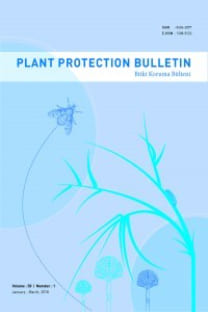Eustigmaeus segnis (Koch) (Acari: Stigmaeidae)’in deutonimf deri altındaki farat dişisinin bulgusu
Akar, Deri değişimi, Eustigmaeus, Farat, Kütikula
The discovery of pharate female of Eustigmaeus segnis (Koch) (Acari: Stigmaeidae) in its deutonymphal integument
Mite, Moulting, Eustigmaeus, Pharate, Cuticle,
___
- Beard J., Ochoa R., 2010. Ontogenetic modification in the Tuckerellidae (Acari: Tetranychoidea). International Journal of Acarology, 36, 169-173.
- Bingül M., Doğan S., Dilkaraoğlu S., 2017. Contributions to the knowledge of the mite genus Stigmaeus Koch, 1836 (Acari: Stigmaeidae) of Turkey. European Journal of Taxonomy, 307, 1-16.
- Bolton S.J., Klompen H., Bauchan G.R., Ochoa R., 2014. A new genus and species of Nematalycidae (Acari: Endeostigmata). Journal of Natural History, 48, 1359-1373.
- Dilkaraoğlu S., 2016. Harşit Vadisi ve Örümcek Ormanları’nın (Türkiye) Raphignathoidea (Acari) faunası. Fırat Üniversitesi, Fen Bilimleri Enstitüsü, Biyoloji Anabilim Dalı, Elazığ, Doktora Tezi, 281 s.
- Dilkaraoğlu S., Doğan S., Erman O., Sevsay S., Adil S., 2016. Harşit vadisi ve Örümcek Ormanları’nın (Türkiye) stigmaeid akarları (Acari: Raphignathoidea: Stigmaeidae). Erzincan Üniversitesi Fen Bilimleri Enstitüsü Dergisi (EÜFBED), 9, 10-72.
- Doğan S., 2005. Eustigmaeus mites from Turkey (Acari: Stigmaeidae). Journal of Natural History, 39, 835-861.
- Doğan S., 2006. Contributions to the knowledge of the raphignathoid mites of Turkey (Acari: Raphignathoidea) with description of a new species. International Journal of Acarology, 32, 371-375.
- Doğan S., 2007. Checklist of raphignathoid mites (Acari: Raphignathoidea) of Turkey. Zootaxa, 1454, 1-26.
- Doğan S., Ayyıldız N., 2003. Mites of the genus Raphignathus (Acari: Raphignathidae) from Turkey. New Zealand Journal of Zoology, 30, 141-148.
- Doğan S., Ayyıldız N., Fan Q.H., 2003. Descriptions of two new species and a newly recorded species of Eustigmaeus from Turkey (Acari: Stigmaeidae). Systematic and Applied Acarology, 8, 131-144.
- Doğan S., Per S., Ayyıldız N., Fan Q.H., 2004. The morphology of developmental stages of Eustigmaeus erciyesiensis Doğan, Ayyıldız and Fan, 2003 (Acari: Stigmaeidae). Gazi University Journal of Science, 17 (4), 21-27.
- Erman O., Özkan M., Ayyıldız N., Doğan S., 2007. Checklist of the mites (Arachnida: Acari) of Turkey. Second supplement. Zootaxa, 1532, 1-21.
- Fan Q.H., Zhang Z.Q., 2005. Raphignathoidea (Acari: Prostigmata). Fauna of New Zealand, 52, Manaaki Whenua Press, New Zealand, 400 p.
- Fan Q.H., Flechtmann C.H.W., De Moraes D.J., 2016. Annotated catalogue of Stigmaeidae (Acari: Prostigmata), with a pictorial key to genera. Zootaxa, 4176, 1-199.
- Fuangarworn M., Butcher B.A., 2015. Contribution to the family Pseudocheylidae (Acari: Trombidiformes) from Thailand: one new species and one new record of Anoplocheylus Berlese, with observations on their ontogeny. International Journal of Acarology, 41, 625-641.
- Gerson U., 1972. A redescription of Ledermuelleria frigida Habeeb (Acarina: Prostigmata: Stigmaeidae). Acta Arachnologica, 24, 15-28.
- Grandjean F., 1944. Observations sur les acariens de la famille des Stigmaeidae. Archives des Sciences Physiques et Naturelles, 26, 103-131.
- Gullan P.J., Cranston P.S., 2010. The insects: An outline of entomology (çeviri ed. Gök A.). Nobel Akademik Yayıncılık, Ankara, 583 s.
- Kaźmierski A., Dończyk J., 2003. Two new free living mite species of Eustigmaeus (Actinedida: Raphignathoidea: Stigmaeidae) from Poland, with new data of some other rare species of the genus. Zootaxa, 198, 1-16.
- Kethley J., 1990. Acarina: Prostigmata (Actinedida). In: Soil Biology Guide. Dindal D.L. (Ed.). John Wiley and Sons, New York, 667-756.
- Koç K., Ayyıldız N., 2000. Türkiye faunası için yeni Eustigmaeus (Acari, Actinedida, Stigmaeidae) türleri. XV. Ulusal Biyoloji Kongresi, 5–9 Eylül, Ankara, p. 62.
- Lindquist E.E., 1986. A means of determining sex in larval Tarsonemidae (Acari: Heterostigmata) based on external structure. Experimental and Applied Acarology, 2, 323- 328.
- Rack G., Eickwort G.C., 1979. Biology and description of a new pygmephorid mite (Acarina: Tarsonemida) associated with the soil-nesting bее Аgapostemon nasutus (Hymenoptera: Halictidae). Acarologia, 21, 267-278.
- Regev S., Cone W.W., 1976. Analyses of pharate female twospotted spider mites for nerolidol and geraniol: Evaluation for sex attraction of males. Environmental Entomology, 5, 133-138.
- Rockett C.L., Woodring J.P., 1972. Comparative studies of acarine limb regeneration, apolysis, and ecdysis. Journal of Insect Physiology, 18, 2319-2336.
- Shatrov A.B., 2000. Ultrastructural organization of hypodermis and formation of cuticle in pharate larva of Leptotrombidium orientale (Acariformes: Trombiculidae). Tsitologiia, 42, 219-27.
- Summers F.M., 1957. American species of Ledermuelleria and Ledermuelleriopsis, with note on new synonym in Neognathus (Acarina, Stigmaeidae, Caligonellidae). Proceedings of the Entomological Society of Washington, 59, 49-60.
- Summers F.M., Price D.W., 1961. New and redescribed species of Ledermuelleria from North America (Acarina: Stigmaeidae). Hilgardia, 31, 369-387.
- ISSN: 0406-3597
- Yayın Aralığı: 4
- Başlangıç: 1952
- Yayıncı: Zirai Mücadele Merkez Araştırma Enstitüsü Müdürlüğü
Mardin ili bağ alanlarındaki Thysanoptera türlerinin popülasyon değişimlerinin belirlenmesi
Eustigmaeus segnis (Koch) (Acari: Stigmaeidae)’in deutonimf deri altındaki farat dişisinin bulgusu
Salih DOĞAN, Sibel DOĞAN, Meryem BİNGÜL
Mardin ili bağ alanlarındaki Thysanoptera (thrips) türlerinin popülasyon değişimlerinin belirlenmesi
Şahin KÖK, Nihat AKTAÇ, İşıl ÖZDEMİR, İsmail KASAP
Okan ÖZGÜR, Tülay AKTURA TATLI, Mahmut GÜNEŞ
Bursa ilinde şarka hastalığının (Plum pox virus) yaygınlığının belirlenmesi
Cansu SAYDAM, Ümit ARSLAN, Figen ERSOY, İbrahim Özer ELİBÜYÜK
